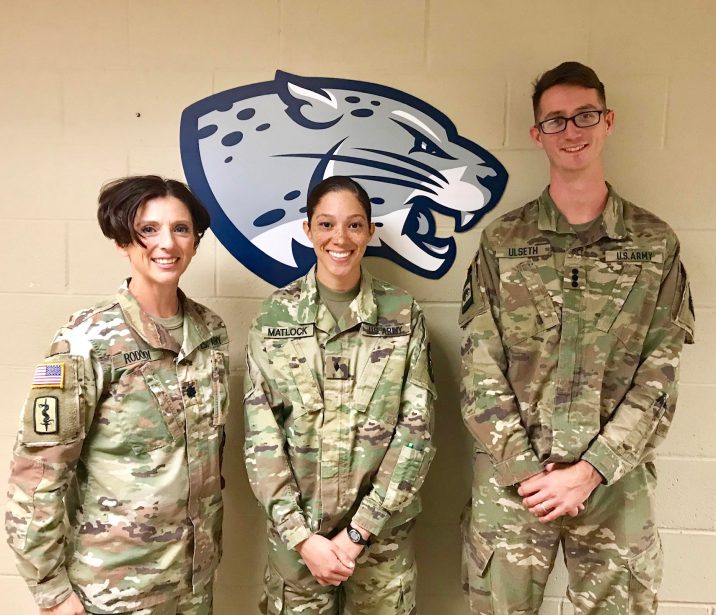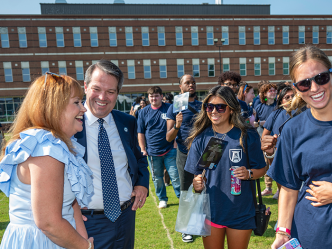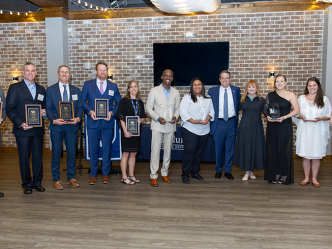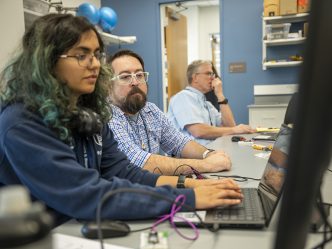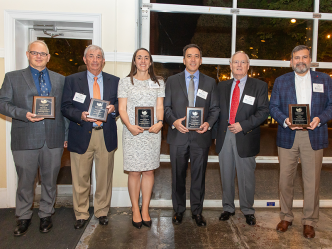Two Augusta University Army ROTC cadets were named Distinguished Military Graduates after participating in Cadet Summer Training at Fort Knox, Kentucky.
It is the third year in a row AU has had at least two DMGs, who finished in the top 20% nationwide. This year’s recipients are Cadet Brittany Matlock and Cadet Greg Ulseth.
Cadet Summer Training is the largest training operation for the United States Army. It trains more than 10,000 Reserve Officer Training Corps (ROTC) Cadets from universities across the nation in 100 days to prepare them for future careers as Army officers.
Matlock and Ulseth participated in Advanced Camp, which is a 37-day training event designed to assess a cadet’s ability to demonstrate proficiency in basic officer leadership tasks. Cadets in this camp reinforced basic skills through squad (usually between 9-13 cadets) level leader development exercises, and transition to platoon (40-50 cadets) level operations in a company construct. Prior to attending Advanced Camp, cadets receive intelligence updates, preparing them for the geo-political environment to which they will deploy and operate.
“We have a small ROTC program amongst cadet command in general,” Lt. Col. Danielle K. Rodondi said. “For our ROTC to have two distinguished military graduates, it’s just remarkable. It says a lot about the type of students that are coming to Augusta University and it’s a testimony to their hard work and dedication to the program and future.”
‘If I can do it, anyone can’
Matlock, 24, is a senior at Troy University, where she will graduate with a degree in psychology. She applied for the Army Green to Gold program and was accepted to Augusta University ROTC about 2 ½ years ago.
Matlock said going through Advanced Camp wasn’t as big of a culture shock for her because she has served previously, including two years as a dental assistant in Germany, and went through basic training when she was 19 years old. She said this time, she was in a different environment and different headspace.
“We got a lot of thunderstorms that I wasn’t used to in the field, and a lot of ticks that I was not a fan of. But it helped me help other people that weren’t used to that environment that were younger than me as well,” she said. “My educational background really helped me cope with things a lot easier. I was able to process it instead of just being overwhelmed and shocked.”
Matlock said you have to be prepared for Advanced Camp while keeping your mindset focused on what you need to accomplish.
“You have to be willing to take orders in the same type of environment that you’re used to, but from different people,” she said. “You have to deal with students from different schools and they have their certain way of doing things, and we have our certain way because we’re smaller … we definitely have to be ready to adjust to things a lot easier.”
Building others up
Matlock was able to take the family foundation mentality they’ve established here with her to Kentucky and used it to her advantage.
“Since we are so close (here), we kind of get in each other’s Kool-Aid … we know what’s going on,” she said. “We can be there for somebody if they need help … you build each other up instead of tearing each other down.”
Matlock said training with AU has been one of the best decisions she’s ever made, especially with the leadership training she’s received from Lt. Col. Rodondi, Master Sgt. Travis Logan and Capt. Peter Ahching.
“I’ve been able to focus on my studies and then with the one class here at Augusta University, I’m able to focus on that one class here. I don’t get flustered with having it at the same place and most of my classes are either at the VISTA site for Troy or online,” she said. “So it really helps me out whenever I can go, not at my own pace because they have deadlines, too, but it’s a lot easier to read at my own pace versus, OK, you have three chapters due by the end of today and a test tomorrow or test in two days or something of that nature.
“I have a test at the end of the week for that entire week’s worth of material and I feel like I retain a lot more that way. So it’s been a lot easier for me. Especially because in my prior service, that’s all I did was online classes at night,” Matlock said.
“I feel like the program overall is really good. We really focus on what each individual cadet needs to get them ready, not only as an individual but as a group for camp so that they can shine through and do what they need to do,” she said. “As for Lt. Col. Rodondi, Master Sgt. Logan and Capt. Ahching, I’ve never met a team that has so much motivation and mentorship. They have a lot of ideas on how I want to be as a leader and they definitely helped mold me into wanting to be a better leader.”
Becoming a DMG was the furthest thing from her mind when she entered the program.
“I was constantly having to adapt to the different places I was being thrown into, and that was really tough for me, but I was resilient enough to do right,” she said. “And it really meant a lot to me to get the DMG slot because I was told I couldn’t do it. But if I can do it, anyone can do it.”
Finding a way to succeed
Ulseth, 28, is also an Army Green to Gold scholarship winner and is finishing his master of public administration at Augusta University. He said he’s learned a lot more about leadership than he thought he would, which he hopes will give him a leg up by already knowing what’s expected of a leader.
Going into this year, Ulseth knew he would be participating in Advanced Camp in order to be commissioned at the end. Every Military Science III student must participate, he said.
“That way you can come back for your senior year and help train the next MSIIIs,” he said. “This gives us a better idea of what it means to be that tactical leader because the field environment and what you’re actually doing is what a lieutenant would be doing.
Ulseth said the close proximity to Fort Gordon is important, as well has working with people who have prior service time such as Rodondi, Logan and Ahching
“With our class right now, about half of us have served in the past,” Ulseth said. “So to have the skill level and knowledge of even a couple of years, knowing how the Army functions and what to expect, it’s important. This kind of a program is more of a refresher and a change of mindset. This program has absolutely focused a little bit more on the leadership aspects of it. What they’re doing is absolutely right, and the training is rigorous and tough.
“I would say one of the big things about having a smaller school be successful, is that we are able to focus more on the individual and have an ability to see who’s capable of doing what.”
The individual attention and one-on-one relationship go a long way to building morale. That meant a lot as the cadets were going through various life changes, Ulseth said. His family recently moved into their new house in Harlem, and his wife, Sierra, just gave birth to their seventh child.
“There is a level of understanding, that, hey, they need some time to get prepared to come back and we need to catch them up,” he said. “Sure, you might have a mentor-mentee relationship in a bigger program, but that mentor might have five or 10 other people that they’re responsible for and you’re talking about students, too. It’s the school factor that is huge with amazing leadership.”
What it takes to be a leader
He had some difficulty with Advanced Camp because he was away from his wife and all the changes back home, which added an outside stress in addition to the training. He felt he was prepared for it and said he has an ability to adjust quickly to his surroundings.
“The concept of when a leader, be a leader; take charge when in charge. And then when you’re a follower, be a follower,” Ulseth said. “That’s one of the biggest things about Advanced Camp, you have to understand this is a school environment. You’re being tested on both your ability to lead as well as follow. I think that’s kind of missed on the quick descriptions (of training).”
Ulseth feels honored to have been recognized as a DMG this year. After he heard about DMGs last year, he was curious about its significance after seeing it listed in senior military leaders’ biographies.
“It’s not something that is just a ‘check the box’ thing, but after learning about it, I know what’s expected of me, and that I should be mentored to excel,” he said. “It’s a good bit of pressure, but I’m not really worried about that because I’ve always operated at a point where I’ll do what you expect me to do. And if I don’t know how to do it, I don’t really know. To me, a distinguished military graduate is just a signifier of responsibility.”
Ulseth also agrees with Matlock when it comes to Rodondi, Logan and Ahching’s leadership and what it means to the program.
“They give the resources for learning, but Lt. Col. Rodondi delegates authority to the cadet leadership and that gives us the ability to go through that planning process and allows us to struggle while we figure it out,” he said. “They don’t hold our hand in that process, they facilitate, and when we stray too far from the path, they’ll rein us back in and correct us. But it’s that learning by doing mentality that I think again, our cadre here sets set us apart from others.
“(Master Sgt. Logan and Capt. Ahching) are definitely very motivational individuals. They have that personality where it comes out and they want to give you a hug and take pictures,” Ulseth added. “They definitely exude the leader attributes of character, presence and intellect.”
With all that is going on in his life, Ulseth credits his family and religion for helping find a healthy balance.
“When I was younger, I struggled with patience and perspective. Perspective is huge when it comes to just your task at hand,” he said. “I’ve had to prioritize and understand that if I have to fail at one thing, so that something catastrophic doesn’t happen, it’s going to happen. My patience has come from my children; they’ve taught me to take a step back. It’s really understanding what’s happening, and resiliency is really key to that.”
 Augusta University
Augusta University
